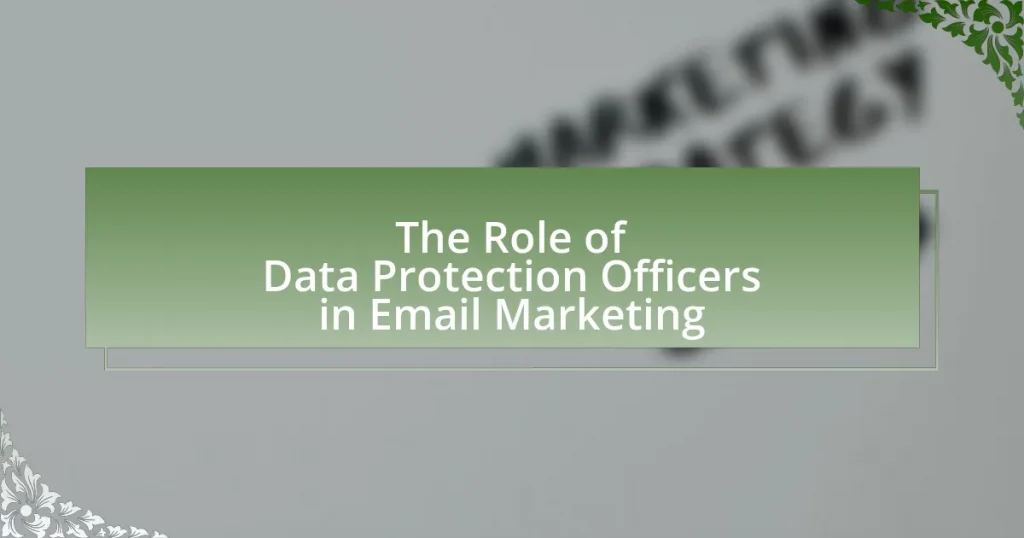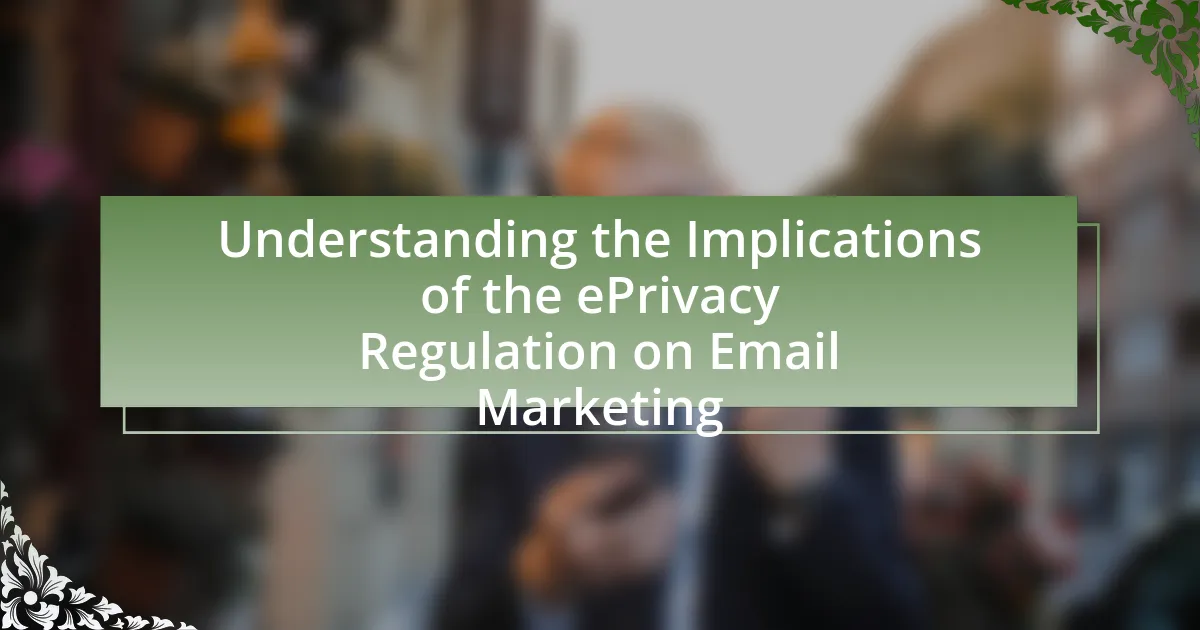Data Protection Officers (DPOs) are essential in email marketing, ensuring compliance with data protection regulations such as the General Data Protection Regulation (GDPR) and the ePrivacy Directive. Their responsibilities include overseeing the lawful collection and processing of personal data, managing consent from individuals, conducting audits, and providing training to staff on data protection practices. DPOs also assess risks associated with email marketing campaigns, implement policies to protect consumer data, and serve as a point of contact for data subjects and regulatory authorities. The article highlights the critical role of DPOs in fostering a culture of data protection, mitigating compliance risks, and enhancing consumer trust in email marketing efforts.
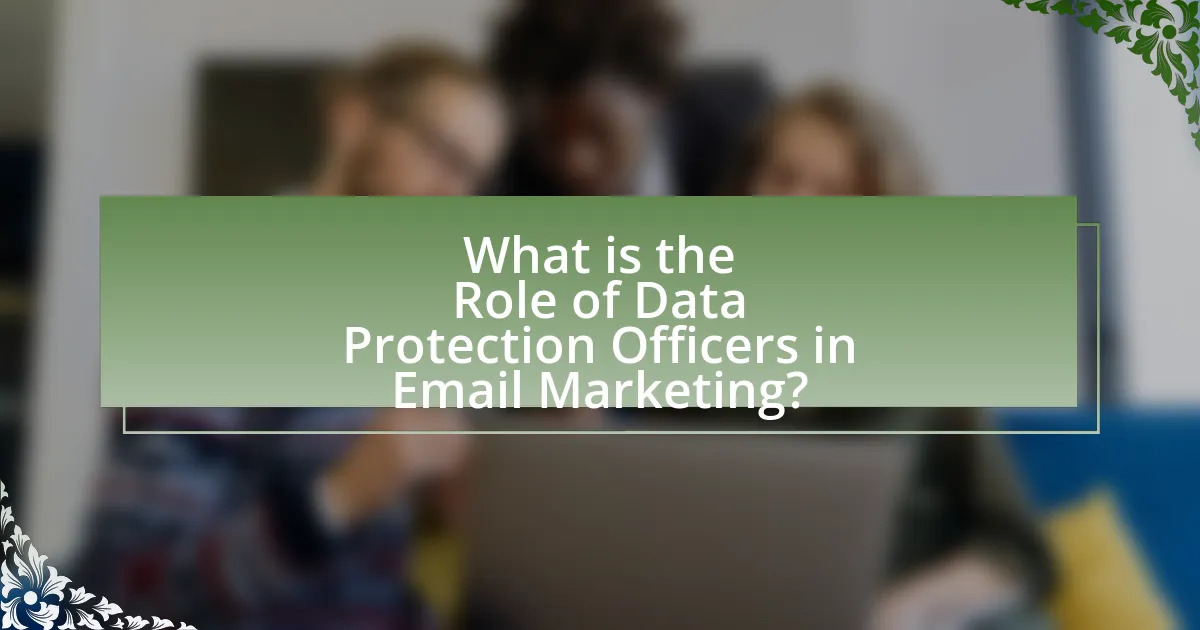
What is the Role of Data Protection Officers in Email Marketing?
Data Protection Officers (DPOs) play a crucial role in email marketing by ensuring compliance with data protection regulations such as the General Data Protection Regulation (GDPR). DPOs are responsible for overseeing the collection, storage, and processing of personal data, which includes managing consent from individuals for receiving marketing emails. They also provide guidance on best practices for data handling and help organizations mitigate risks associated with data breaches. Furthermore, DPOs are tasked with training staff on data protection policies and serving as a point of contact for data subjects and regulatory authorities, thereby reinforcing the organization’s commitment to data privacy in email marketing efforts.
How do Data Protection Officers contribute to compliance in email marketing?
Data Protection Officers (DPOs) ensure compliance in email marketing by overseeing data protection strategies and practices that align with legal requirements. They assess email marketing campaigns to ensure that personal data is collected, processed, and stored in accordance with regulations such as the General Data Protection Regulation (GDPR). DPOs also provide guidance on obtaining explicit consent from recipients, which is crucial for lawful email marketing. Furthermore, they conduct regular audits and risk assessments to identify potential compliance issues, thereby mitigating risks associated with data breaches and non-compliance penalties. Their role is essential in fostering a culture of data protection within organizations, ensuring that email marketing practices respect consumer privacy rights.
What regulations must Data Protection Officers ensure compliance with?
Data Protection Officers must ensure compliance with the General Data Protection Regulation (GDPR) and the ePrivacy Directive. The GDPR, which came into effect in May 2018, mandates strict guidelines for the collection and processing of personal data within the European Union, emphasizing individuals’ rights to privacy and data protection. The ePrivacy Directive complements the GDPR by specifically addressing privacy in electronic communications, including email marketing practices. Compliance with these regulations is essential for organizations to avoid significant fines and legal repercussions, as non-compliance can result in penalties of up to 4% of annual global turnover or €20 million, whichever is higher, as stipulated by the GDPR.
How do Data Protection Officers assess risks in email marketing practices?
Data Protection Officers assess risks in email marketing practices by conducting thorough evaluations of data handling processes, compliance with regulations, and potential impacts on individuals’ privacy. They analyze the types of personal data collected, the methods of obtaining consent, and the security measures in place to protect that data. For instance, they ensure that email marketing campaigns comply with the General Data Protection Regulation (GDPR) by verifying that consent is explicit and that individuals can easily withdraw it. Additionally, they assess the risks associated with data breaches and the potential for unauthorized access to personal information, which can lead to significant legal and financial repercussions for organizations. This risk assessment process is crucial for maintaining compliance and protecting consumer rights in email marketing.
Why is the role of Data Protection Officers critical in email marketing?
The role of Data Protection Officers (DPOs) is critical in email marketing because they ensure compliance with data protection regulations, such as the General Data Protection Regulation (GDPR). DPOs are responsible for overseeing the collection, storage, and processing of personal data, which is essential in email marketing where customer data is frequently utilized. Their expertise helps organizations avoid legal penalties, as non-compliance can result in fines up to 4% of annual global turnover or €20 million, whichever is higher. By implementing best practices for data handling and privacy, DPOs protect both the organization and the consumers, fostering trust and enhancing brand reputation in email marketing campaigns.
What are the potential consequences of non-compliance in email marketing?
Non-compliance in email marketing can lead to significant legal and financial repercussions. Organizations that fail to adhere to regulations such as the General Data Protection Regulation (GDPR) or the CAN-SPAM Act may face hefty fines, which can reach up to 4% of annual global turnover under GDPR. Additionally, non-compliance can result in reputational damage, loss of customer trust, and potential lawsuits from affected individuals. For instance, in 2020, British Airways was fined £20 million for a data breach that compromised customer information, highlighting the financial risks associated with non-compliance.
How do Data Protection Officers protect consumer data in email campaigns?
Data Protection Officers (DPOs) protect consumer data in email campaigns by ensuring compliance with data protection regulations, such as the General Data Protection Regulation (GDPR). They implement policies and procedures that govern how personal data is collected, stored, and processed during email marketing efforts. DPOs conduct regular audits to assess data handling practices and provide training to marketing teams on data privacy principles. For instance, under GDPR, explicit consent must be obtained from consumers before sending marketing emails, and DPOs oversee this consent management process to ensure it is properly documented and maintained. This proactive approach minimizes the risk of data breaches and enhances consumer trust in email communications.
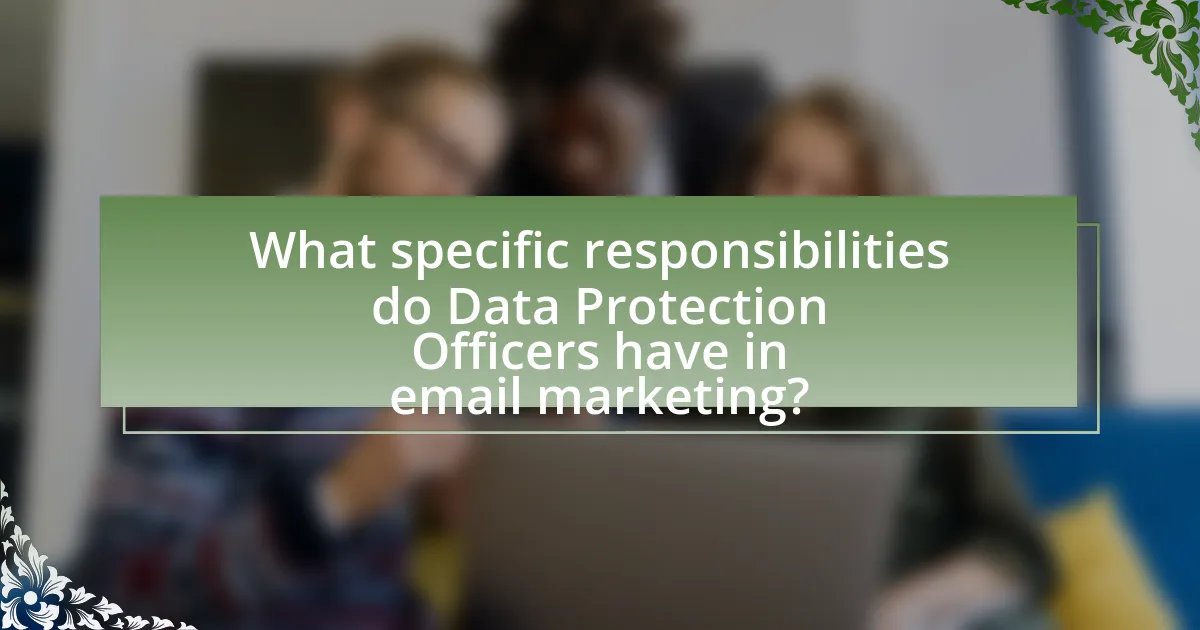
What specific responsibilities do Data Protection Officers have in email marketing?
Data Protection Officers (DPOs) in email marketing are responsible for ensuring compliance with data protection laws, such as the General Data Protection Regulation (GDPR). Their specific responsibilities include overseeing the lawful collection and processing of personal data, ensuring that consent is obtained from individuals before sending marketing emails, and implementing data protection policies that safeguard personal information. DPOs also conduct regular audits to assess compliance, provide training to staff on data protection practices, and serve as a point of contact for individuals regarding their data rights. These responsibilities are critical for maintaining trust and legal compliance in email marketing activities.
How do Data Protection Officers manage data subject rights in email marketing?
Data Protection Officers (DPOs) manage data subject rights in email marketing by ensuring compliance with data protection regulations, such as the General Data Protection Regulation (GDPR). They implement processes that allow individuals to exercise their rights, including access, rectification, erasure, and objection to data processing. DPOs establish clear protocols for handling requests from data subjects, ensuring timely responses within the legally mandated timeframes, typically one month. They also provide training to marketing teams on the importance of consent and data handling practices, reinforcing the necessity of obtaining explicit consent before sending marketing emails. Furthermore, DPOs monitor compliance through regular audits and assessments, ensuring that email marketing practices align with legal requirements and that data subjects’ rights are respected.
What processes do Data Protection Officers implement for data access requests?
Data Protection Officers implement structured processes for handling data access requests to ensure compliance with data protection regulations. These processes typically include verifying the identity of the requester, assessing the validity of the request, and determining the scope of the data being requested. Additionally, Data Protection Officers must respond to requests within a specified timeframe, often within one month, as mandated by regulations such as the General Data Protection Regulation (GDPR). This ensures that individuals can access their personal data while maintaining the integrity and security of that data.
How do Data Protection Officers handle data deletion requests from consumers?
Data Protection Officers (DPOs) handle data deletion requests from consumers by following established protocols that ensure compliance with data protection regulations, such as the General Data Protection Regulation (GDPR). Upon receiving a deletion request, DPOs verify the identity of the consumer to prevent unauthorized access and confirm that the request is valid under applicable laws. They then assess whether the data in question is subject to deletion, considering any legal obligations that may require retention. DPOs document the request and the actions taken, ensuring transparency and accountability in the process. This systematic approach aligns with GDPR Article 17, which outlines the right to erasure, reinforcing the DPO’s role in safeguarding consumer rights while adhering to legal requirements.
What role do Data Protection Officers play in training and awareness?
Data Protection Officers (DPOs) play a crucial role in training and awareness by ensuring that employees understand data protection regulations and best practices. DPOs develop and implement training programs that educate staff on compliance with laws such as the General Data Protection Regulation (GDPR), which mandates that organizations protect personal data. They also create awareness campaigns to highlight the importance of data privacy, helping to foster a culture of accountability within the organization. By conducting regular training sessions and assessments, DPOs ensure that employees are equipped to handle personal data responsibly, thereby reducing the risk of data breaches and non-compliance penalties.
How do Data Protection Officers educate marketing teams on data protection?
Data Protection Officers educate marketing teams on data protection by providing training sessions, developing guidelines, and ensuring compliance with regulations such as GDPR. They conduct workshops that cover the principles of data privacy, the importance of consent, and the implications of data breaches. For instance, a study by the European Data Protection Board highlights that organizations with trained staff are 30% more likely to comply with data protection laws. This structured approach ensures that marketing teams understand their responsibilities in handling personal data, thereby reducing the risk of non-compliance and enhancing consumer trust.
What resources do Data Protection Officers provide for ongoing compliance training?
Data Protection Officers (DPOs) provide various resources for ongoing compliance training, including training sessions, workshops, and e-learning modules tailored to data protection regulations. These resources are designed to ensure that employees understand their responsibilities under laws such as the General Data Protection Regulation (GDPR) and other relevant legislation. DPOs often utilize case studies, real-world scenarios, and compliance checklists to reinforce learning and practical application. Additionally, they may offer access to updated policy documents and guidelines to keep staff informed about changes in data protection laws and best practices.
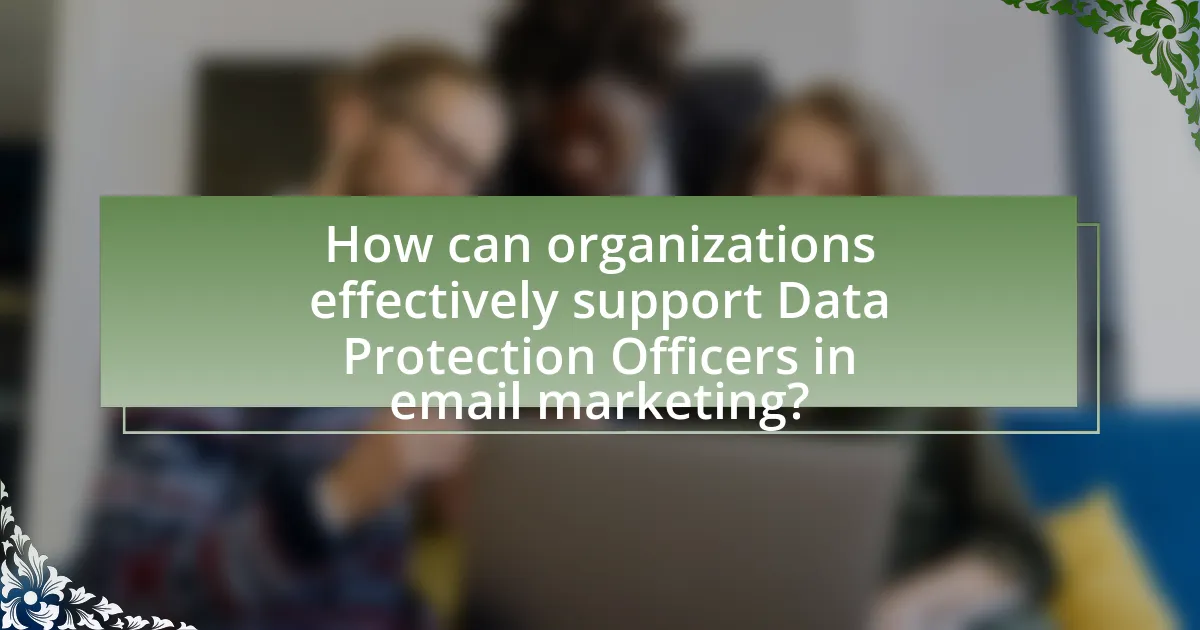
How can organizations effectively support Data Protection Officers in email marketing?
Organizations can effectively support Data Protection Officers (DPOs) in email marketing by providing comprehensive training on data protection regulations and best practices. This training ensures that DPOs are well-versed in compliance requirements such as the General Data Protection Regulation (GDPR), which mandates that organizations obtain explicit consent from individuals before sending marketing emails. Additionally, organizations should implement robust data management systems that facilitate the secure handling of personal data, thereby reducing the risk of breaches and ensuring compliance with legal standards.
Furthermore, regular audits and assessments of email marketing practices can help identify potential risks and areas for improvement, allowing DPOs to proactively address compliance issues. According to a report by the International Association of Privacy Professionals, organizations that prioritize data protection training and compliance measures significantly reduce the likelihood of data breaches, thereby supporting the DPO’s role in maintaining regulatory adherence.
What best practices should organizations adopt to facilitate the role of Data Protection Officers?
Organizations should adopt clear communication channels and provide adequate resources to facilitate the role of Data Protection Officers (DPOs). Establishing direct lines of communication between DPOs and senior management ensures that data protection concerns are prioritized and addressed effectively. Additionally, organizations should allocate sufficient budget and tools for DPOs to perform their duties, including training programs on data protection regulations and technologies. According to the General Data Protection Regulation (GDPR), organizations are required to appoint DPOs and ensure they have the necessary support to fulfill their responsibilities, which include monitoring compliance and providing advice on data protection impact assessments. This structured approach not only enhances the effectiveness of DPOs but also strengthens the overall data protection framework within the organization.
How can technology assist Data Protection Officers in their responsibilities?
Technology can assist Data Protection Officers (DPOs) by automating compliance processes and enhancing data management practices. Automation tools enable DPOs to efficiently monitor data processing activities, ensuring adherence to regulations such as the General Data Protection Regulation (GDPR). For instance, data mapping software can help identify and document data flows, while consent management platforms streamline the collection and management of user consents. Additionally, advanced analytics and reporting tools provide DPOs with insights into data usage and potential risks, facilitating proactive risk management. These technological solutions not only improve operational efficiency but also support DPOs in maintaining compliance and safeguarding personal data.
What collaborative strategies can enhance the effectiveness of Data Protection Officers?
Collaborative strategies that can enhance the effectiveness of Data Protection Officers (DPOs) include establishing cross-departmental communication, engaging in regular training sessions, and implementing a centralized data governance framework. Cross-departmental communication allows DPOs to work closely with IT, marketing, and legal teams, ensuring that data protection measures align with organizational goals and compliance requirements. Regular training sessions keep all employees informed about data protection policies and practices, fostering a culture of compliance and awareness. A centralized data governance framework provides a structured approach to data management, enabling DPOs to monitor data usage and enforce policies effectively. These strategies collectively improve the DPO’s ability to safeguard personal data and ensure compliance with regulations such as the General Data Protection Regulation (GDPR).
What are common challenges faced by Data Protection Officers in email marketing?
Data Protection Officers (DPOs) face several common challenges in email marketing, primarily related to compliance with data protection regulations. One significant challenge is ensuring adherence to the General Data Protection Regulation (GDPR), which mandates explicit consent from individuals before their data can be used for marketing purposes. This requirement complicates the process of building and maintaining email lists, as DPOs must implement robust consent management systems to track and document user permissions accurately.
Another challenge is managing data security risks, as email marketing often involves handling sensitive personal information. DPOs must ensure that appropriate security measures are in place to protect this data from breaches, which can lead to severe penalties and reputational damage. Additionally, DPOs must navigate the complexities of cross-border data transfers, as different jurisdictions may have varying regulations regarding data protection, complicating compliance efforts.
Furthermore, DPOs often encounter difficulties in balancing marketing objectives with privacy concerns. They must educate marketing teams about the importance of data protection while still enabling effective marketing strategies. This requires ongoing training and collaboration to ensure that all marketing practices align with legal requirements.
How do Data Protection Officers address evolving regulations in email marketing?
Data Protection Officers (DPOs) address evolving regulations in email marketing by ensuring compliance with data protection laws such as the General Data Protection Regulation (GDPR) and the California Consumer Privacy Act (CCPA). They implement policies and procedures that align marketing practices with these regulations, including obtaining explicit consent from recipients before sending marketing emails and providing clear opt-out options. DPOs also conduct regular audits and training sessions to keep marketing teams informed about regulatory changes and best practices, thereby minimizing the risk of non-compliance and potential fines.
What strategies can Data Protection Officers use to overcome resource limitations?
Data Protection Officers can overcome resource limitations by prioritizing risk assessments and leveraging technology for automation. By conducting thorough risk assessments, Data Protection Officers can identify critical areas that require immediate attention, allowing them to allocate limited resources effectively. Additionally, utilizing technology such as data management tools and automated compliance solutions can streamline processes, reduce manual workload, and enhance efficiency. For instance, a study by the International Association of Privacy Professionals found that organizations using automated compliance tools reported a 30% reduction in resource expenditure related to data protection tasks. This strategic approach enables Data Protection Officers to maximize their impact despite constraints.
What practical tips can organizations implement to enhance data protection in email marketing?
Organizations can enhance data protection in email marketing by implementing strong encryption methods for email communications. This ensures that sensitive customer data remains secure during transmission, reducing the risk of unauthorized access. Additionally, organizations should adopt double opt-in processes for email subscriptions, which not only confirms user consent but also minimizes the likelihood of spam and data breaches. Regular training for employees on data protection best practices is essential, as it fosters a culture of security awareness and compliance with regulations such as GDPR. Furthermore, organizations must conduct regular audits of their email marketing practices to identify vulnerabilities and ensure adherence to data protection policies. These measures collectively strengthen data security and build trust with customers.
